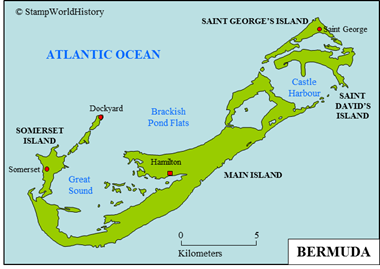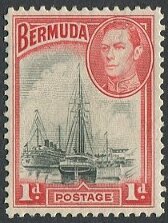
Bermuda
British colony

Bermuda
British overseas territory
Quick reference
General issues: British colony 1865-1968, British colony/Self government 1968-1981, British dependency/Self government 1981-2002, British overseas territory/Self government 2002-Present
Country name on general issues: Bermuda
Special issues: Postmaster issues Hamilton 1848-1856, Saint George 1860, Hamilton 1861
Currency: 1 Pound = 20 Shilling, 1 Shilling = 12 Pence, 1 Pence = 4 Farthings 1848-1970, 1 Dollar = 100 Cents 1970-Present
Population: 16 000 in 1900, 65 000 in 2013
Political history Bermuda
Bermuda is a group of islands located in the Atlantic Ocean, about 1 070 kilometers east of the United States east coast. Prior to colonization Bermuda was uninhabited. The first Europeans to explore Bermuda were the Spanish in 1503. The first permanent settlement was established in 1612 by the British in Saint George. Initially, Bermuda was contracted out to chartered companies, but in 1684 Bermuda was made a colony. Although Bermuda had some form of self government from 1620, it would be in 1968 that self government was embedded in the Bermuda constitution. In 1981, the colony of Bermuda became a British dependency, and in 2002 a British overseas territory.
In the 17th century the chartered companies made a failed attempt at developing agriculture on the islands. After the administration of Bermuda was transferred to the British government, Bermuda, in the 18th century, successfully developed shipbuilding and maritime trade. Trade waned after the British colonies on the American east coast became independent as the United States – while at the same time the strategic importance of Bermuda increased. The British, in the 19th century, established Bermuda as a major naval base. Towards the end of the 19th century tourism started to develop. In the 20th century tourism would grow to become one of the main sources of employment on the islands – although accounting for only 5% of the GDP. Currently, the most important sector is off shore financial services – accounting for 85% of the GDP. Tourism and the financial services sector have made Bermuda a wealthy country: it ranks fourth in the world in terms of per capita GDP.
The largest population groups are blacks, accounting for 54% of the population, and whites, accounting for 31% of the population. The blacks are descendants of slaves and indentured workers, but also of freed slaves that immigrated to Bermuda and immigrants that arrived in Bermuda from the West Indies in the 20th century. The whites are, in majority, of British origin, although a substantial 10% of the population are Portuguese that migrated to Bermuda from the Azores.
Postal history Bermuda
From 1845, the general issues of Great Britain were in use in Bermuda. The first stamps are issued in Bermuda in 1848 by the postmaster of Hamilton for local use in Hamilton and Saint George. They consist of a circular hand stamp reading ‘Hamilton Bermuda’ and the year of issue. The name of the postmaster and the value were inscribed by hand. Stamps of this type were issued until 1856. Further postmaster issues appeared in 1860 in Saint George and again in Hamilton in 1861. Only a few of these stamps exist – the catalog value is in the very high range.
The first definitives were issued in 1865, showing the portrait of Queen Victoria. In the classical period Bermuda issued stamps in the style common to the British colonies, but mostly with designs specific for Bermuda. Also, Bermuda joined in a number of the omnibus issues for the British colonies. In the modern era Bermuda issued a blend of stamps with designs of national interest and designs aimed at the thematic collectors market.
Album pages
← Previous page: BelizeNext page: Bolivia →





